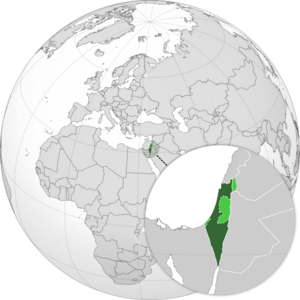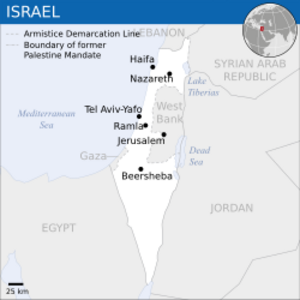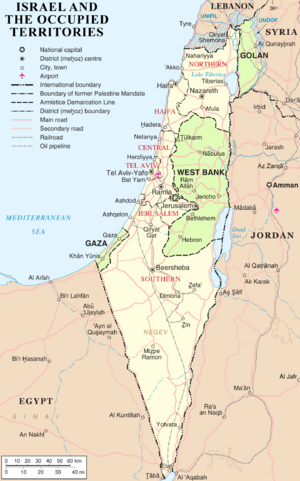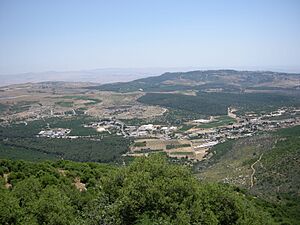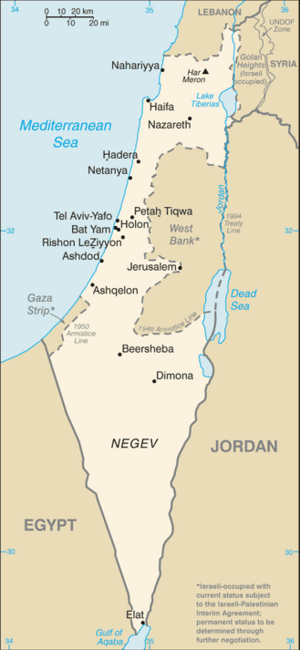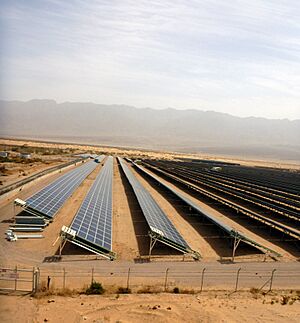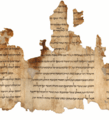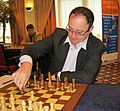Israel facts for kids
Quick facts for kids
State of Israel
|
|
|---|---|
|
Anthem: הַתִּקְוָה (Hatīkvāh; "The Hope")
|
|
|
Israel within internationally recognized borders shown in dark green; Israeli-occupied territories shown in light green
|
|
| Capital and largest city
|
Jerusalem (limited recognition) 31°47′N 35°13′E / 31.783°N 35.217°E |
| Official language | Hebrew |
| Special status | Arabic |
| Ethnic groups
(2022 est.)
|
|
| Religion
(2022 est.)
|
|
| Demonym(s) | Israeli |
| Government | Unitary parliamentary republic |
| Isaac Herzog | |
| Benjamin Netanyahu | |
| Amir Ohana | |
| Legislature | Knesset |
| Establishment | |
| 14 May 1948 | |
|
• Admission to the United Nations
|
11 May 1949 |
|
• Current Basic Law
|
19 July 2018 |
| Area | |
|
• Total
|
22,072 or 20,770 km2 (8,522 or 8,019 sq mi) (149th) |
|
• Water (%)
|
2.71 |
| Population | |
|
• 2026 estimate
|
9,900,000 (93rd) |
|
• 2022 census
|
9,601,720 |
|
• Density
|
462/km2 (1,196.6/sq mi) (29th) |
| GDP (PPP) | 2024 estimate |
|
• Total
|
|
|
• Per capita
|
|
| GDP (nominal) | 2024 estimate |
|
• Total
|
|
|
• Per capita
|
|
| Gini (2021) | ▲ 37.9 medium |
| HDI (2022) | very high · 25th |
| Currency | New shekel (₪) (ILS) |
| Time zone | UTC+2:00 (IST) |
|
• Summer (DST)
|
UTC+3:00 (IDT) |
| Date format | |
| Driving side | right |
| Calling code | +972 |
| ISO 3166 code | IL |
| Internet TLD | .il |
The State of Israel is a country in Southwest Asia. It is located on the eastern side of the Mediterranean Sea. Israel became an independent country in 1948. It is the only Jewish country in the world. Many Jews around the world see Israel as their spiritual home.
In 2022, Israel had about 9.6 million people. Most of them are Jewish. Other citizens include Arabs, who are mostly Muslims, Christians, and Druze. Jerusalem is Israel's largest city and its capital. However, most countries have their embassies in Tel Aviv.
Israel is a small country with many different landscapes. It has mountains, deserts, shores, valleys, and plains. The weather is usually hot and dry in summer. Winters are cool and rainy.
Israel does not have many natural resources. It needs to import more goods than it exports. Still, people in Israel have a good standard of living. Most people can read and write. Israel is also considered a democratic country in the Middle East.
Contents
A Look at Israel's History
Israel has a very long history, going back thousands of years. Two major world religions, Judaism and Christianity, started here. This land is important to Jews because their nation and religion first grew here. Both Jews and Christians call it the Holy Land. This is because many important events from the Bible happened here.
Ancient Times in Israel
About 4,000 years ago, the land of Israel was home to the Canaanites and other Semitic people. Around 1400 BCE, a group called the Hebrews settled in Canaan. They were led by Moses and Joshua. These people were known as the "Children of Israel" or "Israelites." They were divided into 12 tribes.
Later, the Hebrews chose Saul as their first king. The next king, David, started the Kingdom of Israel around 1000 BCE. He made Jerusalem his capital city. His son, Solomon, built the first Temple for their God. After Solomon died around 928 BCE, his kingdom split into two parts. The northern part kept the name Israel. The southern part, called Judah, kept Jerusalem as its capital.
The Assyrians conquered the Kingdom of Israel in 732 BCE. Later, the Babylonians conquered the Kingdom of Judah in 586 BCE. They also destroyed Solomon's Temple. Many Jews were taken to Babylonia. But many returned and rebuilt their country and the Temple. Over time, different empires ruled the Land of Israel. These included the Persians, the Greeks, and then the Romans.
The Jews fought against the Romans, but the Romans won. In 70 CE, the Romans destroyed Jerusalem and the Second Jewish Temple. In 135 CE, the Romans defeated the Jews again. Many Jews were killed or forced to leave their homeland. The number of Jews living in Israel became much smaller. This spreading of Jewish communities outside of Israel is called the Diaspora.
Many Jews who stayed moved to the Galilee region. Important Jewish books, like the Mishnah and parts of the Talmud, were written there between the 2nd and 4th centuries CE. The Romans started calling this region "Palestine." The Roman and then the Byzantine empires ruled until 635 CE. Then, Arabs conquered the region. Different Arab rulers, and for a while Crusaders, ruled the land. In 1516, the Ottoman Empire took control and ruled until the 20th century.
Modern Israel's Beginnings
After the Diaspora, many Jews wished for a new homeland in Israel. In the 1880s, this wish became a movement called Zionism. Jews from all over the world began to move to the area. They settled in desert areas. At that time, the land was ruled by the Turkish government, and later by the British Government.
On May 14, 1948, British control over Palestine ended. The Jewish people living there, led by David Ben-Gurion, declared their independence. This created the new Jewish state of Israel. Right after Israel declared independence, armies from nearby countries like Egypt, Syria, Jordan, and Iraq attacked the new country. Since the 1980s, Israel's main military challenges have come from groups like Hezbollah.
Israel's Geography
Israel is bordered by Lebanon and Syria to the north. Jordan is to the east, and Egypt is to the southwest. Israel also controls the West Bank of the Jordan River.
Israel has a long coastline along the Mediterranean Sea. In the south, the city of Eilat is on the Gulf of Aqaba, which is part of the Red Sea.
The Galilee is a fertile and mountainous area in the north. To the west, near the Mediterranean coast, there is a flat area called the Coastal Plain. The Negev Desert is a dry area in the south. It has flat plains, mountains, and craters. In the center of the country, a range of mountains runs from north to south.
On the eastern side, there is a low area called a depression. The Hula Valley and the Sea of Galilee are in this low area in the north. The Jordan River flows from the Sea of Galilee to the Dead Sea. The land next to the Dead Sea is the lowest in the world. It is 426 meters (about 1,398 feet) below sea level.
The weather is usually hot and dry in the summer. Winters are mild. Most rain falls in the winter, between November and April. The north gets more rain than the south. The desert areas get very little rain. Israel has built a large irrigation system. This system brings water from the north to the dry southern areas. This helps crops grow there.
Jerusalem is the biggest city in Israel. Other large cities include Tel Aviv, Haifa, Beersheba, and Rishon LeZion. Jerusalem is the capital city.
How Israel's Government Works
National Government
Israel is a parliamentary democracy. This means that citizens elect people to represent them in a parliament. All Israeli citizens who are 18 years or older can vote. Israel's parliament is called the Knesset. The Knesset has 120 members. Each member is elected for up to four years.
The Knesset makes laws for the country. It also helps decide national policy and approves the government's budget and taxes.
When people vote in Knesset elections, they do not vote for individual people. Instead, they vote for a party. Each party has a list of its candidates. The number of seats a party gets in the Knesset depends on the percentage of votes it wins. For example, if a party wins 33 percent of the votes, it gets 40 Knesset seats.
Israel does not have a single written constitution. Instead, the Knesset has created "Basic Laws." These Basic Laws explain how the government should work. They also protect the civil rights of citizens.
The Prime Minister is the head of Israel's government. This person is usually the leader of the party that has the most seats in the Knesset. The prime minister needs the support of most Knesset members to stay in office. The prime minister appoints ministers to the cabinet. The Knesset must approve these appointments. Ministers are responsible for different areas like education, defense, and social welfare. The prime minister leads the cabinet meetings and makes the final decisions.
The President is the head of state. The Knesset elects the president for a seven-year term. Most of the president's duties are ceremonial. The president signs laws and treaties approved by the Knesset. They also appoint judges and members of some public groups. The president also receives documents from ambassadors and foreign diplomats when they are appointed.
Political Parties and Opinions
Israel has many political parties. These parties have a wide variety of opinions. In recent elections, many parties have won seats in the Knesset.
The parties generally fall into three main groups. The largest groups are the Zionist parties. These include conservative parties like Likud. There are also social democratic parties, such as Kadima and the Labor Party. And there are religious Zionist parties. Smaller parties include Orthodox Jewish parties, special-interest parties, and Israeli Arab parties.
Usually, no single party wins enough seats in the Knesset to have a majority on its own. So, one of the bigger parties asks for support from other parties to form a coalition government. This often gives smaller parties a lot of power.
The Likud party supports free market policies. They believe the government should have limited involvement in the economy. Likud strongly believes in protecting Israel's security. They want to give less away in peace talks with the Palestinians and Arab states.
The Labor Party supports some government control over the economy. But they also believe in a limited amount of free enterprise. This party says it is willing to give more in exchange for peace agreements with the Palestinians and Arab states.
Kadima is a centrist political party. They believe in both Israel's security and continuing the peace process. They support negotiating a peace agreement with the Palestinians.
Israel's Economy
When Israel became independent, it was a poor country. It had little agricultural or industrial production. But Israel's economy has grown a lot since 1948. The country now has a good standard of living. This is true even though it has few natural resources and a limited water supply.
Many immigrants came to Israel right after independence. A lot of these immigrants were skilled workers and professionals. They helped the nation's economy grow a great deal.
Service Industries
Many people in Israel's service industry work for the government or for government-owned businesses. Government workers provide many services needed by Israel's large immigrant population. These services include housing, education, and job training.
Tourism
Tourism is a very important source of income for Israel. Tourists visit many archaeological, historical, and religious sites. They also visit museums, nature reserves, and beach resorts.
Tourists support many service industries, especially trade, restaurants, and hotels. In 2009, over 2.7 million foreign tourists visited Israel.
Manufacturing
Israeli factories make many goods. These include chemical products, electronic equipment, fertilizer, paper, plastics, and processed foods. They also produce scientific and optical instruments, textiles, and clothing. The cutting of imported diamonds is a major industry. Government-owned plants manufacture equipment for Israel's large armed forces. Israel is also the world's largest exporter of drones. Tel Aviv and Haifa are Israel's main manufacturing centers.
Agriculture
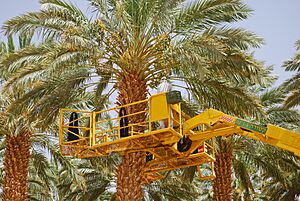
In the past, a much larger part of Israel's workforce was in Agriculture. But now, machines do much of the work that people used to do. Important agricultural products include citrus and other fruits, eggs, grain, poultry, and vegetables.
The government helps develop, finance, and control agricultural activities. This includes fishing and forestry. Israel produces most of the food it needs for its people, except for grain. The money from agricultural exports helps pay for any food imports. Most Israeli farmers use modern farming methods. Water from the Sea of Galilee is used to irrigate large areas of land in Israel.
Most Israeli farms are organized as moshavim or kibbutzim. Israel also has some private farms.
Mining
The Dead Sea, which is the world's saltiest body of water, is Israel's main source of minerals. Bromine, magnesium, potash, and table salt are taken from the sea. Potash, which is mainly used in fertilizers, is the most important mineral.
In the Negev Desert, there are mines for phosphates, copper, clay, and gypsum.
Energy Sources
Israel has few energy sources of its own. It does not have coal or hydroelectric power. It only has small amounts of crude oil and natural gas. Because of this, Israel relies on imported crude oil for gasoline and diesel for transportation. It also imports coal to produce electricity.
Solar energy – energy from the sun – is widely used to heat water for homes. Israel is also working on other ways to use solar energy to power houses and factories.
In 2008, Israel started investing in building electric cars and charging stations for them. There might also be large natural gas fields in the Mediterranean Sea that Israel could develop.
International Trade
Israel imports more goods than it exports because it has few natural resources. The country's main imports include chemicals, computer equipment, grain, iron and steel, military equipment, petroleum products, rough diamonds, and textiles.
Israel's main exports are chemical products, citrus fruits, clothing, electronic equipment, fertilizers, polished diamonds, military equipment, and processed foods. Israel's main trading partners include the Benelux countries (Belgium, the Netherlands, and Luxembourg), Germany, Italy, Switzerland, the United Kingdom, and the United States.
Transportation
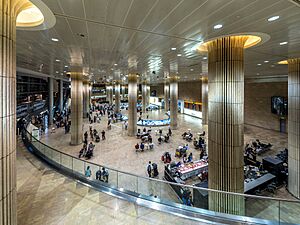
Israel has a well-developed transportation system. Most middle-class Israeli families own a car or have one provided by their employer. Paved roads reach almost all parts of the country. Public transportation within and between cities is mainly by bus.
Ben-Gurion Airport is Israel's main international airport. It is located near Tel Aviv. Smaller airports are in Atarot, near Jerusalem, and in Eilat. El Al, Israel's international airline, has regular flights to the United States, Canada, Europe, and parts of Africa and Asia. Israel has three major deepwater ports: Haifa, Ashdod, and Eilat.
Communications
Israel's communication system is one of the best in the Middle East. Israel has about 30 daily newspapers. About half of them are in Hebrew. The rest are in Arabic, Yiddish, or other foreign languages. The Israel Broadcasting Authority, a public company, runs the television and non-military radio stations.
Images for kids
-
The Large Stone Structure, an archaeological site in Jerusalem
-
A part of the Temple Scroll, one of the Dead Sea Scrolls, written during the Second Temple period
-
Jews at the Western Wall in the 1870s
-
The First Zionist Congress (1897) in Basel, Switzerland
-
UN Map, showing the "Palestine plan of partition with economic union"
-
Israel's 1980 law stated that "Jerusalem, complete and united, is the capital of Israel."
-
Shimon Peres (left) with Yitzhak Rabin (center) and King Hussein of Jordan (right), before signing the Israel–Jordan peace treaty in 1994.
-
Immigration to Israel from 1948 to 2015. The two highest points were in 1949 and 1990.
-
The Dome of the Rock and the Western Wall, Jerusalem.
-
Mount Scopus Campus of the Hebrew University of Jerusalem
-
The Diamond Exchange District in Ramat Gan
-
Tel Aviv Stock Exchange. Its building is designed for computer trading.
-
The world's largest solar parabolic dish at the Ben-Gurion National Solar Energy Center.
-
Ein Bokek resort on the shore of the Dead Sea
-
Shmuel Yosef Agnon, who won the Nobel Prize in Literature
-
Israel Philharmonic Orchestra conducted by Zubin Mehta
-
Shrine of the Book, where the Dead Sea Scrolls are kept in Jerusalem
-
A meal including falafel, hummus, French fries and Israeli salad
-
Teddy Stadium of Jerusalem
-
Boris Gelfand, a chess Grandmaster
See also
 In Spanish: Israel para niños
In Spanish: Israel para niños




